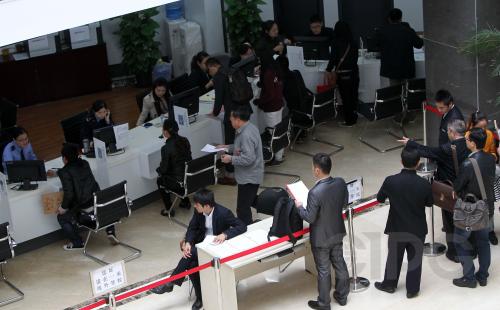| 
People line up for enterprise registration at the business service hall of the Shanghai Pilot Free Trade Zone on October 25
The Chinese Government released a rangeof reform and opening up policies, as is customary, ahead of the Third Plenary Session of the 18th Central Committee of the Communist Party of China (CPC), which ran from November 9 to 12. This year, the corporate registration system was included in the reform package.
On October 25, Premier Li Keqiang hosted an executive meeting of the State Council, and gave five specific instructions for reforms of business operations. These measures indicate another major reform of the modern corporate system.
"By widening market access and establishing a transparent and efficient modern company registration system, we aim to further streamline government administration, create fair competition and support smaller businesses, especially innovative enterprises," Xinhua News Agency reported Li as saying at the meeting.
Encouraging startups
AsChina's first corporation law was published in 1993, the modern corporate system has been in place for a mere 20 years. At that time,Chinaadopted a legal capital system. That is to say, companies had to have registered capital paid in full. Moreover, startups were required to ensure that the value of corporate assets was equivalent to registered capital.
It was not until 2005 that the statutory capital system was replaced with an authorized capital system, which didn't demand stakeholders to pay registered capital in full. This system also reduced the minimum requirement of registered capital for limited liability companies and joint stock companies to 30,000 yuan ($4,900) and 5 million yuan ($820,500), respectively. This greatly lowered the threshold for startups and boosted the enthusiasm to invest.
Nonetheless, the old corporate registered capital system has lagged behind the economic change and entrepreneurial environment. Therefore, it can no longer meet the demands of innovative, small and micro-sized enterprises. As countries across the world try to create a favorable institutional environment for startups, such thresholds are handicaps for entrepreneurs.
In 2009, within the scope of related laws, rules and regulations, the State Administration for Industry and Commerce began to carry out a pilot program of corporate registration system reforms inBeijing,Shanghaiand southChina's Guangdong Province.
In Pudong District,Shanghai, the requirement for registered capital has been completely eliminated, and measures facilitating flexible ways of registration have yielded satisfactory results.
The newly released company registered capital system also needs to be justified through pilot program experience.
Zhang Liqun, a research fellow from the Development Research Center of the State Council, argued that the reforms indicated the government had shifted from examinations and approvals to supervision, and would significantly restrain administrative forces from interfering in the market. In the future, it will be easier for entrepreneurs to start a company, while the government will be stricter in monitoring corporate operations.
The move will help improve the investment environment, intensify the stable economic upswing, and stimulate the vitality of social investment.
Predating the unveiling of reforms on the registered capital system, a "383 Plan" for reform was submitted by the Development Research Center of the State Council to the Third Plenary Session of the 18th CPC Central Committee. The blueprint quickly stirred up heated debates.
Inclusive market economy
The plan aims to set up a vibrant, innovative, inclusive market economy protected by the rule of law. It listed a reform trinity - the market, government and corporations, eight key sectors and three packages for likely breakthroughs, and has thus been dubbed the 383 Plan.
The plan involves a succession of hot issues, many of which are also the difficulties confronted byChina. Some policy adjustment measures are bold, decisive and inspiring.
The blueprint indicates a heavy focus on reforms this time round, reforms that will be pushed forward with much determination in more sectors, reminiscent of the landmark Third Plenary Session of the 11th CPC Central Committee held in late 1978.
Looking back at that plenary session, which raised the curtain onChina's reform and opening up, the country moved forward carefully and cautiously, and mistakes, to some extent, were tolerated.
Today, things have changed. Reforms have to address deep-seated institutional loopholes and emerging challenges. Hence, there is little room for error.
Naturally the 383 Plan cannot solve all the problems that hinderChina's progress, and more reforms will follow. This year, the new Chinese leadership has unveiled seven reform policies, including reducing administrative intervention, expanding the pilot program of replacing business tax with a value-added tax, and interest rate liberalization. In the following days more in-depth measures and policies will be decided on to pushChina's reform and opening up even further. |